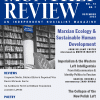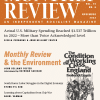
December 2023 (Volume 75, Number 7)
This month, the editors discuss the U.S. threat of a “new Opium War against China” found in the pages of the Air Force’s Journal of Indo-Pacific Affairs. In addition, MR affirms its solidarity with the Palestinian people in their struggle against genocide. | more…

Marxian Ecology and Sustainable Human Development
Mahesh Maskey, editor of Bampanth (Nepal), interviews John Bellamy Foster about the growing emphasis on Marxian ecology among socialists in the Global South and North and the history of solidarity between MR and Nepali leftists. | more…

Imperialist Propaganda and the Ideology of the Western Left Intelligentsia: From Anticommunism and Identity Politics to Democratic Illusions and Fascism
In this interview with Zhao Dingqi of World Socialism Studies, Gabriel Rockhill dives deep into the CIA’s campaign to propagate thinly veiled imperialist and capitalist ideology through the institutions of the Western left intelligentsia—and how this state of affairs continues among intellectuals to this day. | more…

The Collapse of the New Polish Left
Over the past decades, the left in Poland has found its political ambitions frustrated by an inability to connect with the general electorate, pushing the movement collectively toward dissolution. In this timely article, Damian Winczewski explores the shifting constellations attempting to revive Polish left. | more…

Corporate Media, Political Elites, and Perpetual War
David Michael Smith reviews journalist Norman Solomon’s War Made Invisible, an eloquent moral call to end the bloody state of perpetual war that the United States has engaged in since the advent of the “war on terror.” | more…

Until Tomorrow, Comrades: An Antifascist Novel in Brilliant English Translation
What lessons can be drawn from the struggle against fascism in the previous century? One answer, Jacques LaPere writes, can be found the new English translation of Portuguese antifascist Manuel Tiago’s Until Tomorrow, Comrades. | more…

Care is a relative term
A new poem by Marge Piercy. | more…

heaven is a place on earth
An new poem by arson. | more…

November 2023 (Volume 75, Number 6)
In 2022, China released its “Global Civilization Initiative,” a document enumerating China’s commitment to fostering diversity, equality, and cultural exchange. The editors analyze how the U.S. foreign policy community and media jumped to attack the initiative in the interest of defending U.S. imperial strategy around the globe. | more…

‘Monthly Review’ and the Environment
In this personal interview with Batuhan Sarican, John Bellamy Foster discusses the idea ecosocialism, relating it to his personal relationship to the environment and our collective relationship to the metabolism of nature. | more…

Actual U.S. Military Spending Reached $1.537 Trillion in 2022—More than Twice Acknowledged Level: New Estimates Based on U.S. National Accounts
How much does it cost to maintain an empire? A stunning new analysis by Gisela Cernadas and John Bellamy Foster shows the true scale of U.S. military spending, which far outstrips conventional estimates, which use data gleaned from traditional sources. | more…

What Do We Learn about Capitalism from Chip War?
Chip War (Simon and Schuster, 2022) by Chris Miller is a detailed accounting of the U.S. efforts to retain control of the computer chip industry—an industry that has become vital to nearly all aspects of modern life. Rahul Varman explores and expands on these themes, asking all the while: What can the escalating wars over this crucial technology teach us about global capitalism? | more…

Platform Company Dominance and Labor Struggles in the Digital Economy: The Case of South Korea
Kyung-Pil Kim charts the history of the Korean platform economy through the rise of Naver and Kakao, the major firms dominating the markets. How do these companies operate? How did they achieve dominance? Finally, what are recent developments and challenges of labor organizing in this sphere? | more…